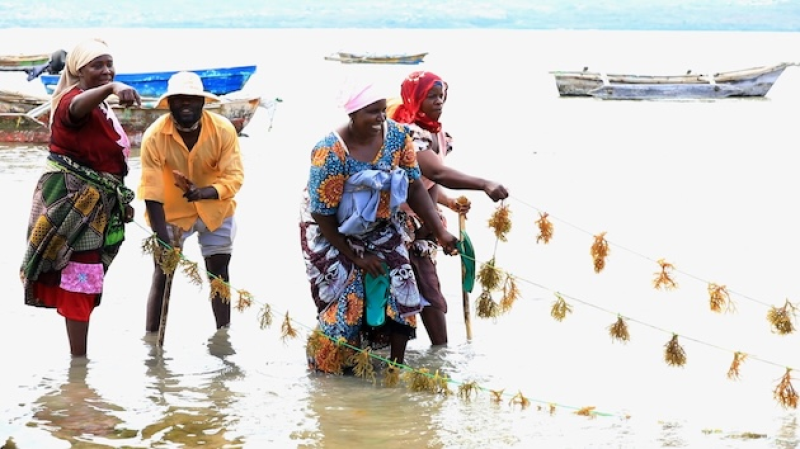- BNP senses ‘dangerous conspiracy’ against democratic transition |
- CEC Vows Credible Election to End Stigma |
- High-level meeting reviews country’s economic progress |
- Dhaka suspends visa, consular services at its Delhi, Agartala Missions |
- Govt to cut savings certificate profit rates from January |
Zanzibar’s Blue Economy Faces Gender Gaps Amid Climate Risks

Saada Juma (L) works with fellow seaweed farmers at Jambiani coast in Zanzibar.
At dawn on the white-sand shores of Jambiani, 45-year-old Saada Juma braces against the tide, wrangling ropes laced with seaweed. Her hands, hardened by decades of labor, move instinctively as she secures her aquatic crop.
“I’ve been farming seaweed since I was a teenager,” she says, squinting against the morning sun. “This ocean is our life. But for us women, it’s always been a fight to be seen, to be heard.”
Juma is one of thousands of Zanzibari women sustaining the island’s marine economy through seaweed farming, artisanal fishing, ecotourism, and conservation. While their labor underpins Zanzibar’s blue economy—a model leveraging marine resources for sustainable development—many women say the system still favors men.
Seaweed farming became a prominent source of income in Zanzibar in the 1990s, especially for women. Yet climate change is altering this once-reliable livelihood.
“I started farming seaweed because my mother did it. Now my daughters do it too,” says 52-year-old Mwantumu Suleiman. “But we’re stuck in the same place. The sea has changed, and we have not been helped to change with it.”
Warming waters and stronger tides make shallow-water cultivation increasingly unviable. Venturing further offshore is risky, especially as most women cannot swim or access diving gear, leaving them reliant on hired help.
Juma examines a torn seaweed rope in the surf. “These tools are not made for us,” she says. “They break easily, and we have nowhere to store or dry the harvest properly. We need better equipment.”
Limited access to finance, poor infrastructure, and insufficient training prevent women from fully benefiting from their labor. “Seaweed farmers earn the least, even though we do the hardest work,” she adds. “We want to make creams, soaps, drinks—but no one trains us.”
To address these imbalances, Zanzibar’s government—supported by UN Women and Norway—launched the Blue Economy Gender Strategy and Action Plan in 2022, the first in the region to embed gender equity in marine policy.
“Women are not just participants; they are leaders,” says Asha Ali, a gender advisor. The plan includes skills training, access to credit, and designated sea plots for women.
Some women are already driving reform. Amina Salim, 40, leads a women’s seaweed cooperative and advocates for policy change. Under her leadership, women have secured training, engaged in policymaking, and petitioned local authorities for better tools and designated farming zones.
Zanzibar’s blue economy accounts for nearly 30% of the islands’ GDP and employs one-third of its population. Experts warn the sector’s sustainability is threatened by gender disparities and environmental degradation.
“Empowering women benefits the entire economy,” says Dr. Nasra Bakari, a marine economist. Community-led projects, including coral reef restoration and ecotourism, show promise for sustainable development.
At the 2025 UN Ocean Conference in France, Tanzania highlighted aquatic foods as a solution to hunger, climate resilience, and sustainable growth. Zanzibar’s Minister for Blue Economy and Fisheries, Shaaban Ali Othman, emphasized gender equity, climate adaptation, and sustainable marine practices.
Training centers aim to equip youth with climate-smart aquaculture skills, from pond farming to low-carbon feed techniques. The Marine Spatial Planning initiative maps zones for tourism, shipping, conservation, and fishing to prevent conflicts and protect sensitive areas.
Women like Zulekha Khamis and Mariam Hamad are testing new seaweed farming techniques and producing value-added products such as soaps and cosmetics, boosting income and self-reliance. Zanzibar plans a Blue Economy Investment Forum and incubator to connect entrepreneurs with ethical investors, though challenges remain.
“Banks don’t understand blue startups,” says Imani Kombo, a 29-year-old ecotourism entrepreneur. “We need patient capital that sees beyond profit.”
Back in Jambiani, Juma ties her final line of seaweed to dry. “We’ve been patient with promises. Now we need results,” she says. She dreams of controlling the full value chain—from sea to shelf.
As Zanzibar advances its blue economy, women’s voices are clear: the sea may sustain life, but without equity and inclusion, prosperity will remain out of reach.

